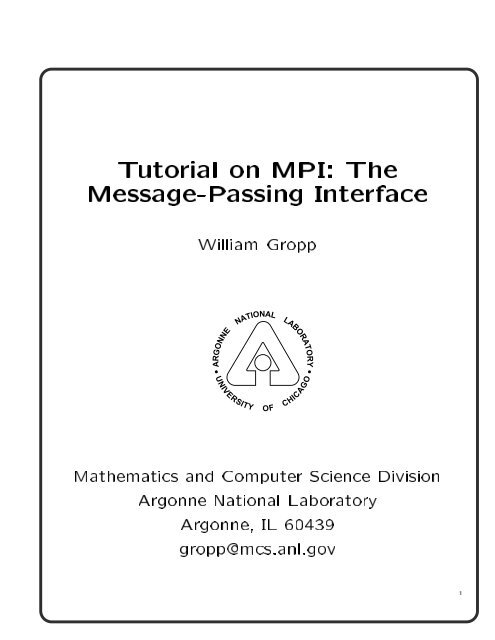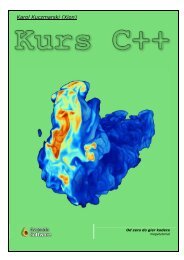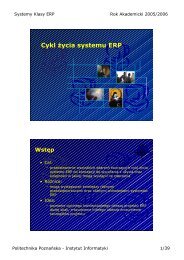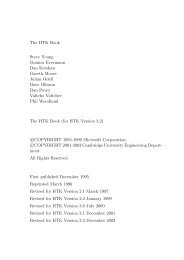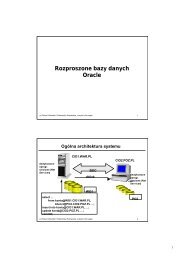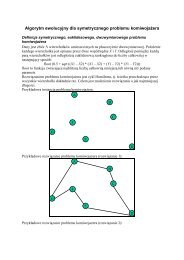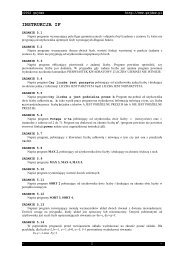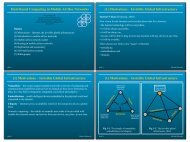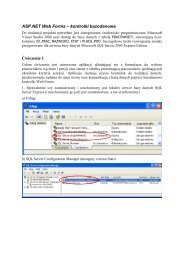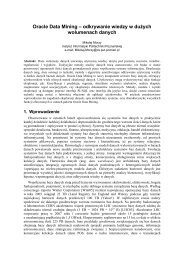Tutorial on MPI: The Message-Passing Interface
Tutorial on MPI: The Message-Passing Interface
Tutorial on MPI: The Message-Passing Interface
You also want an ePaper? Increase the reach of your titles
YUMPU automatically turns print PDFs into web optimized ePapers that Google loves.
•<br />
•<br />
<str<strong>on</strong>g>Tutorial</str<strong>on</strong>g> <strong>on</strong> <strong>MPI</strong>: <strong>The</strong><br />
<strong>Message</strong>-<strong>Passing</strong> <strong>Interface</strong><br />
William Gropp<br />
ARGONNE<br />
NATIONAL<br />
LABORATORY<br />
UNIVERSITY<br />
OF<br />
CHICAGO<br />
Mathematics and Computer Science Divisi<strong>on</strong><br />
Arg<strong>on</strong>ne Nati<strong>on</strong>al Laboratory<br />
Arg<strong>on</strong>ne, IL 60439<br />
gropp@mcs.anl.gov<br />
1
Course Outline<br />
Background <strong>on</strong> Parallel Computing<br />
Getting Started<br />
<strong>MPI</strong> Basics<br />
Intermediate <strong>MPI</strong><br />
Tools for writing libraries<br />
Final comments<br />
Thanks to Rusty Lusk for some of the material in this<br />
tutorial.<br />
This tutorial may beused in c<strong>on</strong>juncti<strong>on</strong> with<br />
the book \Using <strong>MPI</strong>" which c<strong>on</strong>tains detailed<br />
descripti<strong>on</strong>s of the use of the <strong>MPI</strong> routines.<br />
Material that beings with this symbol is `advanced'<br />
and may be skipped <strong>on</strong> a rst reading.<br />
2
Background<br />
Parallel Computing<br />
Communicating with other processes<br />
Cooperative operati<strong>on</strong>s<br />
One-sided operati<strong>on</strong>s<br />
<strong>The</strong> <strong>MPI</strong> process<br />
3
Parallel Computing<br />
Separate workers or processes<br />
Interact by exchanging informati<strong>on</strong><br />
4
Types of parallel computing<br />
All use dierent data for each worker<br />
Data-parallel Same operati<strong>on</strong>s <strong>on</strong> dierent<br />
data. Also called SIMD<br />
SPMD Same program, dierent data<br />
MIMD Dierent programs, dierent data<br />
SPMD and MIMD are essentially the same<br />
because any MIMD can be made SPMD<br />
SIMD is also equivalent, but in a less<br />
practical sense.<br />
<strong>MPI</strong> is primarily for SPMD/MIMD. HPF is<br />
an example of a SIMD interface.<br />
5
Communicating with other processes<br />
Data must be exchanged with other workers<br />
Cooperative | all parties agree to<br />
transfer data<br />
One sided | <strong>on</strong>e worker performs<br />
transfer of data<br />
6
Cooperative operati<strong>on</strong>s<br />
<strong>Message</strong>-passing is an approach that makes<br />
the exchange of data cooperative.<br />
Data must both be explicitly sent and<br />
received.<br />
An advantage is that any change in the<br />
receiver's memory is made with the receiver's<br />
participati<strong>on</strong>.<br />
Process 0 Process 1<br />
SEND( data )<br />
RECV( data )<br />
7
One-sided operati<strong>on</strong>s<br />
One-sided operati<strong>on</strong>s between parallel<br />
processes include remote memory reads and<br />
writes.<br />
An advantage is that data can be accessed<br />
without waiting for another process<br />
Process 0 Process 1<br />
PUT( data )<br />
(Memory)<br />
Process 0 Process 1<br />
(Memory)<br />
GET( data )<br />
8
Class Example<br />
Take a pad of paper. Algorithm: Initialize with the<br />
number of neighbors you have<br />
Compute average of your neighbor's values and<br />
subtract from your value. Make thatyour new<br />
value.<br />
Repeat until d<strong>on</strong>e<br />
Questi<strong>on</strong>s<br />
1. How doyou get values from your neighbors<br />
2. Which step or iterati<strong>on</strong> do they corresp<strong>on</strong>d to<br />
Do you know Do you care<br />
3. How doyou decide when you are d<strong>on</strong>e<br />
9
Hardware models<br />
<strong>The</strong> previous example illustrates the<br />
hardware models by how data is exchanged<br />
am<strong>on</strong>g workers.<br />
Distributed memory (e.g., Parag<strong>on</strong>, IBM<br />
SPx, workstati<strong>on</strong> network)<br />
Shared memory (e.g., SGI Power<br />
Challenge, Cray T3D)<br />
Either may be used with SIMD or MIMD<br />
software models.<br />
All memory is distributed.<br />
10
What is <strong>MPI</strong><br />
A message-passing library specicati<strong>on</strong><br />
{ message-passing model<br />
{ not a compiler specicati<strong>on</strong><br />
{ not a specic product<br />
For parallel computers, clusters, and heterogeneous<br />
networks<br />
Full-featured<br />
Designed to permit (unleash) the development of<br />
parallel software libraries<br />
Designed to provide access to advanced parallel<br />
hardware for<br />
{ end users<br />
{ library writers<br />
{ tool developers<br />
11
Motivati<strong>on</strong> for a New Design<br />
<strong>Message</strong> <strong>Passing</strong> now mature as programming<br />
paradigm<br />
{ well understood<br />
{ ecient match to hardware<br />
{ many applicati<strong>on</strong>s<br />
Vendor systems not portable<br />
Portable systems are mostly research projects<br />
{ incomplete<br />
{ lack vendor support<br />
{ not at most ecient level<br />
12
Motivati<strong>on</strong> (c<strong>on</strong>t.)<br />
Few systems oer the full range of desired features.<br />
modularity (for libraries)<br />
access to peak performance<br />
portability<br />
heterogeneity<br />
subgroups<br />
topologies<br />
performance measurement tools<br />
13
<strong>The</strong> <strong>MPI</strong> Process<br />
Began at Williamsburg Workshop in April, 1992<br />
Organized at Supercomputing '92 (November)<br />
Followed HPF format and process<br />
Met every six weeks for two days<br />
Extensive, open email discussi<strong>on</strong>s<br />
Drafts, readings, votes<br />
Pre-nal draft distributed at Supercomputing '93<br />
Two-m<strong>on</strong>th public comment period<br />
Final versi<strong>on</strong> of draft in May, 1994<br />
Widely available now <strong>on</strong> the Web, ftp sites, netlib<br />
(http://www.mcs.anl.gov/mpi/index.html)<br />
Public implementati<strong>on</strong>s available<br />
Vendor implementati<strong>on</strong>s coming so<strong>on</strong><br />
14
Who Designed <strong>MPI</strong><br />
Broad participati<strong>on</strong><br />
Vendors<br />
{ IBM, Intel, TMC, Meiko, Cray, C<strong>on</strong>vex, Ncube<br />
Library writers<br />
{ PVM, p4, Zipcode, TCGMSG, Chamele<strong>on</strong>,<br />
Express, Linda<br />
Applicati<strong>on</strong> specialists and c<strong>on</strong>sultants<br />
Companies Laboratories Universities<br />
ARCO ANL UC Santa Barbara<br />
C<strong>on</strong>vex GMD Syracuse U<br />
Cray Res LANL Michigan State U<br />
IBM LLNL Oreg<strong>on</strong> Grad Inst<br />
Intel NOAA UofNewMexico<br />
KAI NSF Miss. State U.<br />
Meiko ORNL U of Southampt<strong>on</strong><br />
NAG PNL U of Colorado<br />
nCUBE Sandia Yale U<br />
ParaSoft SDSC UofTennessee<br />
Shell SRC UofMaryland<br />
TMC<br />
Western Mich U<br />
U of Edinburgh<br />
Cornell U.<br />
Rice U.<br />
U of San Francisco<br />
15
Features of <strong>MPI</strong><br />
General<br />
{ Communicators combine c<strong>on</strong>text and group for<br />
message security<br />
{ Thread safety<br />
Point-to-point communicati<strong>on</strong><br />
{ Structured buers and derived datatypes,<br />
heterogeneity<br />
{ Modes: normal (blocking and n<strong>on</strong>-blocking),<br />
synchr<strong>on</strong>ous, ready (to allow access to fast<br />
protocols), buered<br />
Collective<br />
{ Both built-in and user-dened collective<br />
operati<strong>on</strong>s<br />
{ Large number of data movement routines<br />
{ Subgroups dened directly or by topology<br />
16
Features of <strong>MPI</strong> (c<strong>on</strong>t.)<br />
Applicati<strong>on</strong>-oriented process topologies<br />
{ Built-in support for grids and graphs (uses<br />
groups)<br />
Proling<br />
{ Hooks allow users to intercept <strong>MPI</strong> calls to<br />
install their own tools<br />
Envir<strong>on</strong>mental<br />
{ inquiry<br />
{ error c<strong>on</strong>trol<br />
17
Features not in <strong>MPI</strong><br />
N<strong>on</strong>-message-passing c<strong>on</strong>cepts not included:<br />
{ process management<br />
{ remote memory transfers<br />
{ active messages<br />
{ threads<br />
{ virtual shared memory<br />
<strong>MPI</strong> does not address these issues, but has tried to<br />
remain compatible with these ideas (e.g. thread<br />
safety as a goal, intercommunicators)<br />
18
Is <strong>MPI</strong> Large or Small<br />
<strong>MPI</strong> is large (125 functi<strong>on</strong>s)<br />
{ <strong>MPI</strong>'s extensive functi<strong>on</strong>ality requires many<br />
functi<strong>on</strong>s<br />
{ Number of functi<strong>on</strong>s not necessarily a measure<br />
of complexity<br />
<strong>MPI</strong> is small (6 functi<strong>on</strong>s)<br />
{ Many parallel programs can be written with just<br />
6 basic functi<strong>on</strong>s.<br />
<strong>MPI</strong>isjustright<br />
{ One can access exibility when it is required.<br />
{ One need not master all parts of <strong>MPI</strong> to use it.<br />
19
Where to use <strong>MPI</strong><br />
You need a portable parallel program<br />
You are writing a parallel library<br />
You have irregular or dynamic data<br />
relati<strong>on</strong>ships that do not t a data<br />
parallel model<br />
Where not to use <strong>MPI</strong>:<br />
You can use HPF or a parallel Fortran 90<br />
You d<strong>on</strong>'t need parallelism at all<br />
You can use libraries (which may be<br />
written in <strong>MPI</strong>)<br />
20
Why learn <strong>MPI</strong><br />
Portable<br />
Expressive<br />
Good way to learn about subtle issues in<br />
parallel computing<br />
21
Getting started<br />
Writing <strong>MPI</strong> programs<br />
Compiling and linking<br />
Running <strong>MPI</strong> programs<br />
More informati<strong>on</strong><br />
{ Using <strong>MPI</strong> by William Gropp, Ewing Lusk,<br />
and Anth<strong>on</strong>y Skjellum,<br />
{ <strong>The</strong> LAM compani<strong>on</strong> to \Using <strong>MPI</strong>..." by<br />
Zdzislaw Meglicki<br />
{ Designing and Building Parallel Programs by<br />
Ian Foster.<br />
{ A<str<strong>on</strong>g>Tutorial</str<strong>on</strong>g>/User's Guide for <strong>MPI</strong> by Peter<br />
Pacheco<br />
(ftp://math.usfca.edu/pub/<strong>MPI</strong>/mpi.guide.ps)<br />
{ <strong>The</strong> <strong>MPI</strong> standard and other informati<strong>on</strong> is<br />
available at http://www.mcs.anl.gov/mpi. Also<br />
the source for several implementati<strong>on</strong>s.<br />
22
Writing <strong>MPI</strong> programs<br />
#include "mpi.h"<br />
#include <br />
int main( argc, argv )<br />
int argc<br />
char **argv<br />
{<br />
<strong>MPI</strong>_Init( &argc, &argv )<br />
printf( "Hello world\n" )<br />
<strong>MPI</strong>_Finalize()<br />
return 0<br />
}<br />
23
Commentary<br />
#include "mpi.h" provides basic <strong>MPI</strong><br />
deniti<strong>on</strong>s and types<br />
<strong>MPI</strong>_Init starts <strong>MPI</strong><br />
<strong>MPI</strong>_Finalize exits <strong>MPI</strong><br />
Note that all n<strong>on</strong>-<strong>MPI</strong> routines are local<br />
thus the printf run <strong>on</strong> each process<br />
24
Compiling and linking<br />
For simple programs, special compiler<br />
commands can be used. For large projects,<br />
it is best to use a standard Makele.<br />
<strong>The</strong> <strong>MPI</strong>CH implementati<strong>on</strong> provides<br />
the commands mpicc and mpif77<br />
as well as `Makefile' examples in<br />
`/usr/local/mpi/examples/Makefile.in'<br />
25
Special compilati<strong>on</strong> commands<br />
<strong>The</strong> commands<br />
mpicc -o first first.c<br />
mpif77 -o firstf firstf.f<br />
may be used to build simple programs when using<br />
<strong>MPI</strong>CH.<br />
<strong>The</strong>se provide special opti<strong>on</strong>s that exploit the proling<br />
features of <strong>MPI</strong><br />
-mpilog Generate log les of <strong>MPI</strong> calls<br />
-mpitrace Trace executi<strong>on</strong> of <strong>MPI</strong> calls<br />
-mpianim Real-time animati<strong>on</strong> of <strong>MPI</strong> (not available<br />
<strong>on</strong> all systems)<br />
<strong>The</strong>re are specic to the <strong>MPI</strong>CH implementati<strong>on</strong><br />
other implementati<strong>on</strong>s may provide similar commands<br />
(e.g., mpcc and mpxlf <strong>on</strong> IBM SP2).<br />
26
Using Makeles<br />
<strong>The</strong> le `Makefile.in' is a template Makele.<br />
<strong>The</strong> program (script) `mpirec<strong>on</strong>fig' translates<br />
this to a Makele for a particular system.<br />
This allows you to use the same Makele for<br />
a network of workstati<strong>on</strong>s and a massively<br />
parallel computer, even when they use<br />
dierent compilers, libraries, and linker<br />
opti<strong>on</strong>s.<br />
mpirec<strong>on</strong>fig Makefile<br />
Note that you must have `mpirec<strong>on</strong>fig' in<br />
your PATH.<br />
27
Sample Makele.in<br />
##### User c<strong>on</strong>figurable opti<strong>on</strong>s #####<br />
ARCH = @ARCH@<br />
COMM = @COMM@<br />
INSTALL_DIR = @INSTALL_DIR@<br />
CC<br />
= @CC@<br />
F77<br />
= @F77@<br />
CLINKER = @CLINKER@<br />
FLINKER = @FLINKER@<br />
OPTFLAGS = @OPTFLAGS@<br />
#<br />
LIB_PATH = -L$(INSTALL_DIR)/lib/$(ARCH)/$(COMM)<br />
FLIB_PATH =<br />
@FLIB_PATH_LEADER@$(INSTALL_DIR)/lib/$(ARCH)/$(COMM)<br />
LIB_LIST = @LIB_LIST@<br />
#<br />
INCLUDE_DIR = @INCLUDE_PATH@ -I$(INSTALL_DIR)/include<br />
### End User c<strong>on</strong>figurable opti<strong>on</strong>s ###<br />
28
Sample Makele.in (c<strong>on</strong>'t)<br />
CFLAGS = @CFLAGS@ $(OPTFLAGS) $(INCLUDE_DIR) -D<strong>MPI</strong>_$(ARCH)<br />
FFLAGS = @FFLAGS@ $(INCLUDE_DIR) $(OPTFLAGS)<br />
LIBS = $(LIB_PATH) $(LIB_LIST)<br />
FLIBS = $(FLIB_PATH) $(LIB_LIST)<br />
EXECS = hello<br />
default: hello<br />
all: $(EXECS)<br />
hello: hello.o $(INSTALL_DIR)/include/mpi.h<br />
$(CLINKER) $(OPTFLAGS) -o hello hello.o \<br />
$(LIB_PATH) $(LIB_LIST) -lm<br />
clean:<br />
.c.o:<br />
.f.o:<br />
/bin/rm -f *.o *~ PI* $(EXECS)<br />
$(CC) $(CFLAGS) -c $*.c<br />
$(F77) $(FFLAGS) -c $*.f<br />
29
Running <strong>MPI</strong> programs<br />
mpirun -np 2 hello<br />
`mpirun' is not part of the standard, but<br />
some versi<strong>on</strong> of it is comm<strong>on</strong> with several<br />
<strong>MPI</strong> implementati<strong>on</strong>s. <strong>The</strong> versi<strong>on</strong> shown<br />
here is for the <strong>MPI</strong>CH implementati<strong>on</strong> of<br />
<strong>MPI</strong>.<br />
Just as Fortran does not specify how<br />
Fortran programs are started, <strong>MPI</strong> does not<br />
specify how <strong>MPI</strong> programs are started.<br />
<strong>The</strong> opti<strong>on</strong> -t shows the commands that<br />
mpirun would execute you can use this to<br />
nd out how mpirun starts programs <strong>on</strong> yor<br />
system. <strong>The</strong> opti<strong>on</strong> -help shows all opti<strong>on</strong>s<br />
to mpirun.<br />
30
Finding out about the envir<strong>on</strong>ment<br />
Two of the rst questi<strong>on</strong>s asked in a parallel<br />
program are: How many processes are there<br />
and Who am I<br />
How many is answered with <strong>MPI</strong>_Comm_size<br />
and who am I is answered with <strong>MPI</strong>_Comm_rank.<br />
<strong>The</strong> rank is a number between zero and<br />
size-1.<br />
31
A simple program<br />
#include "mpi.h"<br />
#include <br />
int main( argc, argv )<br />
int argc<br />
char **argv<br />
{<br />
int rank, size<br />
<strong>MPI</strong>_Init( &argc, &argv )<br />
<strong>MPI</strong>_Comm_rank( <strong>MPI</strong>_COMM_WORLD, &rank )<br />
<strong>MPI</strong>_Comm_size( <strong>MPI</strong>_COMM_WORLD, &size )<br />
printf( "Hello world! I'm %d of %d\n",<br />
rank, size )<br />
<strong>MPI</strong>_Finalize()<br />
return 0<br />
}<br />
32
Caveats<br />
<strong>The</strong>se sample programs have been kept<br />
as simple as possible by assuming that all<br />
processes can do output. Not all parallel<br />
systems provide this feature, and <strong>MPI</strong><br />
provides a way to handle this case.<br />
33
Exercise - Getting Started<br />
Objective: Learn how to login, write,<br />
compile, and run a simple <strong>MPI</strong> program.<br />
Run the \Hello world" programs. Try two<br />
dierent parallel computers. What does the<br />
output look like<br />
34
Sending and Receiving messages<br />
Process 0 Process 1<br />
A:<br />
Send<br />
Recv<br />
B:<br />
Questi<strong>on</strong>s:<br />
To whom is data sent<br />
What is sent<br />
How does the receiver identify it<br />
35
Current <strong>Message</strong>-<strong>Passing</strong><br />
Atypical blocking send looks like<br />
send( dest, type, address, length )<br />
where<br />
{ dest is an integer identier representing the<br />
process to receive the message.<br />
{ type is a n<strong>on</strong>negative integer that the<br />
destinati<strong>on</strong> can use to selectively screen<br />
messages.<br />
{ (address, length) describes a c<strong>on</strong>tiguous area in<br />
memory c<strong>on</strong>taining the message to be sent.<br />
and<br />
Atypical global operati<strong>on</strong> looks like:<br />
broadcast( type, address, length )<br />
All of these specicati<strong>on</strong>s are a good match to<br />
hardware, easy to understand, but too inexible.<br />
36
<strong>The</strong> Buer<br />
Sending and receiving <strong>on</strong>ly a c<strong>on</strong>tiguous array of<br />
bytes:<br />
hides the real data structure from hardware which<br />
might be able to handle it directly<br />
requires pre-packing dispersed data<br />
{ rows of a matrix stored columnwise<br />
{ general collecti<strong>on</strong>s of structures<br />
prevents communicati<strong>on</strong>s between machines with<br />
dierent representati<strong>on</strong>s (even lengths) for same<br />
data type<br />
37
Generalizing the Buer Descripti<strong>on</strong><br />
Specied in <strong>MPI</strong> by starting address, datatype, and<br />
count, where datatype is:<br />
{ elementary (all C and Fortran datatypes)<br />
{ c<strong>on</strong>tiguous array of datatypes<br />
{ strided blocks of datatypes<br />
{ indexed array of blocks of datatypes<br />
{ general structure<br />
Datatypes are c<strong>on</strong>structed recursively.<br />
Specicati<strong>on</strong>s of elementary datatypes allows<br />
heterogeneous communicati<strong>on</strong>.<br />
Eliminati<strong>on</strong> of length in favor of count is clearer.<br />
Specifying applicati<strong>on</strong>-oriented layout of data<br />
allows maximal use of special hardware.<br />
38
Generalizing the Type<br />
A single type eld is too c<strong>on</strong>straining. Often<br />
overloaded to provide needed exibility.<br />
Problems:<br />
{ under user c<strong>on</strong>trol<br />
{ wild cards allowed (<strong>MPI</strong>_ANY_TAG)<br />
{ library use c<strong>on</strong>icts with user and with other<br />
libraries<br />
39
Sample Program using Library Calls<br />
Sub1 and Sub2 are from dierent libraries.<br />
Sub1()<br />
Sub2()<br />
Sub1a and Sub1b are from the same library<br />
Sub1a()<br />
Sub2()<br />
Sub1b()<br />
Thanks to Marc Snir for the following four examples<br />
40
Correct Executi<strong>on</strong> of Library Calls<br />
Process 0 Process 1 Process 2<br />
Sub1<br />
recv(any)<br />
send(1)<br />
recv(any)<br />
send(0)<br />
Sub2<br />
recv(1)<br />
send(0)<br />
recv(2)<br />
send(1)<br />
send(2)<br />
recv(0)<br />
41
Incorrect Executi<strong>on</strong> of Library Calls<br />
Process 0 Process 1 Process 2<br />
Sub1<br />
recv(any) send(1)<br />
recv(any)<br />
send(0)<br />
Sub2<br />
recv(1)<br />
send(0)<br />
recv(2)<br />
send(1)<br />
send(2)<br />
recv(0)<br />
42
Correct Executi<strong>on</strong> of Library Calls with Pending<br />
Communcicati<strong>on</strong><br />
Process 0 Process 1 Process 2<br />
Sub1a<br />
recv(any)<br />
send(1)<br />
send(0)<br />
Sub2<br />
recv(2) send(0)<br />
send(2) recv(1)<br />
send(1)<br />
recv(0)<br />
Sub1b<br />
recv(any)<br />
43
Incorrect Executi<strong>on</strong> of Library Calls with Pending<br />
Communicati<strong>on</strong><br />
Process 0 Process 1 Process 2<br />
Sub1a<br />
recv(any)<br />
send(1)<br />
send(0)<br />
Sub2<br />
recv(2)<br />
send(2)<br />
send(0)<br />
recv(1)<br />
send(1)<br />
recv(0)<br />
Sub1b<br />
recv(any)<br />
44
Soluti<strong>on</strong> to the type problem<br />
A separate communicati<strong>on</strong> c<strong>on</strong>text for each family<br />
of messages, used for queueing and matching.<br />
(This has often been simulated in the past by<br />
overloading the tag eld.)<br />
No wild cards allowed, for security<br />
Allocated by the system, for security<br />
Types (tags, in <strong>MPI</strong>) retained for normal use (wild<br />
cards OK)<br />
45
Delimiting Scope of Communicati<strong>on</strong><br />
Separate groups of processes working <strong>on</strong><br />
subproblems<br />
{ Merging of process name space interferes with<br />
modularity<br />
{ \Local" process identiers desirable<br />
Parallel invocati<strong>on</strong> of parallel libraries<br />
{ <strong>Message</strong>s from applicati<strong>on</strong> must be kept<br />
separate from messages internal to library.<br />
{ Knowledge of library message types interferes<br />
with modularity.<br />
{ Synchr<strong>on</strong>izing before and after library calls is<br />
undesirable.<br />
46
Generalizing the Process Identier<br />
Collective operati<strong>on</strong>s typically operated <strong>on</strong> all<br />
processes (although some systems provide<br />
subgroups).<br />
This is too restrictive (e.g., need minimum over a<br />
column or asumacrossarow, of processes)<br />
<strong>MPI</strong> provides groups of processes<br />
{ initial \all" group<br />
{ group management routines (build, delete<br />
groups)<br />
All communicati<strong>on</strong> (not just collective operati<strong>on</strong>s)<br />
takes place in groups.<br />
A group and a c<strong>on</strong>text are combined in a<br />
communicator.<br />
Source/destinati<strong>on</strong> in send/receive operati<strong>on</strong>s refer<br />
to rank in group associated with a given<br />
communicator. <strong>MPI</strong>_ANY_SOURCE permitted in a<br />
receive.<br />
47
<strong>MPI</strong> Basic Send/Receive<br />
Thus the basic (blocking) send has become:<br />
<strong>MPI</strong>_Send( start, count, datatype, dest, tag,<br />
comm )<br />
and the receive:<br />
<strong>MPI</strong>_Recv(start, count, datatype, source, tag,<br />
comm, status)<br />
<strong>The</strong> source, tag, and count of the message actually<br />
received can be retrieved from status.<br />
Two simple collective operati<strong>on</strong>s:<br />
<strong>MPI</strong>_Bcast(start, count, datatype, root, comm)<br />
<strong>MPI</strong>_Reduce(start, result, count, datatype,<br />
operati<strong>on</strong>, root, comm)<br />
48
Getting informati<strong>on</strong> about a message<br />
<strong>MPI</strong>_Status status<br />
<strong>MPI</strong>_Recv( ..., &status )<br />
... status.<strong>MPI</strong>_TAG<br />
... status.<strong>MPI</strong>_SOURCE<br />
<strong>MPI</strong>_Get_count( &status, datatype, &count )<br />
<strong>MPI</strong>_TAG and <strong>MPI</strong>_SOURCE primarily ofuse when<br />
<strong>MPI</strong>_ANY_TAG and/or <strong>MPI</strong>_ANY_SOURCE in the receive.<br />
<strong>MPI</strong>_Get_count may be used to determine how much<br />
data of a particular type was received.<br />
49
Simple Fortran example<br />
program main<br />
include 'mpif.h'<br />
integer rank, size, to, from, tag, count, i, ierr<br />
integer src, dest<br />
integer st_source, st_tag, st_count<br />
integer status(<strong>MPI</strong>_STATUS_SIZE)<br />
double precisi<strong>on</strong> data(100)<br />
call <strong>MPI</strong>_INIT( ierr )<br />
call <strong>MPI</strong>_COMM_RANK( <strong>MPI</strong>_COMM_WORLD, rank, ierr )<br />
call <strong>MPI</strong>_COMM_SIZE( <strong>MPI</strong>_COMM_WORLD, size, ierr )<br />
print *, 'Process ', rank, ' of ', size, ' is alive'<br />
dest = size - 1<br />
src = 0<br />
C<br />
if (rank .eq. src) then<br />
to = dest<br />
count = 10<br />
tag = 2001<br />
do 10 i=1, 10<br />
10 data(i) = i<br />
call <strong>MPI</strong>_SEND( data, count, <strong>MPI</strong>_DOUBLE_PRECISION, to,<br />
+ tag, <strong>MPI</strong>_COMM_WORLD, ierr )<br />
else if (rank .eq. dest) then<br />
tag = <strong>MPI</strong>_ANY_TAG<br />
count = 10<br />
from = <strong>MPI</strong>_ANY_SOURCE<br />
call <strong>MPI</strong>_RECV(data, count, <strong>MPI</strong>_DOUBLE_PRECISION, from,<br />
+ tag, <strong>MPI</strong>_COMM_WORLD, status, ierr )<br />
50
Simple Fortran example (c<strong>on</strong>t.)<br />
C<br />
call <strong>MPI</strong>_GET_COUNT( status, <strong>MPI</strong>_DOUBLE_PRECISION,<br />
+ st_count, ierr )<br />
st_source = status(<strong>MPI</strong>_SOURCE)<br />
st_tag = status(<strong>MPI</strong>_TAG)<br />
print *, 'Status info: source = ', st_source,<br />
+ ' tag = ', st_tag, ' count = ', st_count<br />
print *, rank, ' received', (data(i),i=1,10)<br />
endif<br />
call <strong>MPI</strong>_FINALIZE( ierr )<br />
end<br />
51
Six Functi<strong>on</strong> <strong>MPI</strong><br />
<strong>MPI</strong> is very simple. <strong>The</strong>se six functi<strong>on</strong>s allow<br />
you to write many programs:<br />
<strong>MPI</strong> Init<br />
<strong>MPI</strong> Finalize<br />
<strong>MPI</strong> Comm size<br />
<strong>MPI</strong> Comm rank<br />
<strong>MPI</strong> Send<br />
<strong>MPI</strong> Recv<br />
52
Atasteof things to come<br />
<strong>The</strong> following examples show a C and<br />
Fortran versi<strong>on</strong> of the same program.<br />
This program computes PI (with a very<br />
simple method) but does not use <strong>MPI</strong>_Send<br />
and <strong>MPI</strong>_Recv. Instead, it uses collective<br />
operati<strong>on</strong>s to send data to and from all of<br />
the running processes. This gives a dierent<br />
six-functi<strong>on</strong> <strong>MPI</strong> set:<br />
<strong>MPI</strong> Init<br />
<strong>MPI</strong> Finalize<br />
<strong>MPI</strong> Comm size<br />
<strong>MPI</strong> Comm rank<br />
<strong>MPI</strong> Bcast<br />
<strong>MPI</strong> Reduce<br />
53
Broadcast and Reducti<strong>on</strong><br />
<strong>The</strong> routine <strong>MPI</strong>_Bcast sends data from <strong>on</strong>e<br />
process to all others.<br />
<strong>The</strong> routine <strong>MPI</strong>_Reduce combines data from<br />
all processes (by adding them in this case),<br />
and returning the result to a single process.<br />
54
Fortran example: PI<br />
program main<br />
include "mpif.h"<br />
double precisi<strong>on</strong><br />
parameter<br />
PI25DT<br />
(PI25DT = 3.141592653589793238462643d0)<br />
c<br />
double precisi<strong>on</strong> mypi, pi, h, sum, x, f, a<br />
integer n, myid, numprocs, i, rc<br />
functi<strong>on</strong> to integrate<br />
f(a) = 4.d0 / (1.d0 + a*a)<br />
call <strong>MPI</strong>_INIT( ierr )<br />
call <strong>MPI</strong>_COMM_RANK( <strong>MPI</strong>_COMM_WORLD, myid, ierr )<br />
call <strong>MPI</strong>_COMM_SIZE( <strong>MPI</strong>_COMM_WORLD, numprocs, ierr )<br />
10 if ( myid .eq. 0 ) then<br />
write(6,98)<br />
98 format('Enter the number of intervals: (0 quits)')<br />
read(5,99) n<br />
99 format(i10)<br />
endif<br />
call <strong>MPI</strong>_BCAST(n,1,<strong>MPI</strong>_INTEGER,0,<strong>MPI</strong>_COMM_WORLD,ierr)<br />
55
Fortran example (c<strong>on</strong>t.)<br />
c<br />
c<br />
if ( n .le. 0 ) goto 30<br />
h = 1.0d0/n<br />
check for quit signal<br />
calculate the interval size<br />
sum = 0.0d0<br />
do 20 i = myid+1, n, numprocs<br />
x = h * (dble(i) - 0.5d0)<br />
sum = sum + f(x)<br />
20 c<strong>on</strong>tinue<br />
mypi = h * sum<br />
c<br />
collect all the partial sums<br />
call <strong>MPI</strong>_REDUCE(mypi,pi,1,<strong>MPI</strong>_DOUBLE_PRECISION,<strong>MPI</strong>_SUM,0,<br />
$ <strong>MPI</strong>_COMM_WORLD,ierr)<br />
c<br />
node 0 prints the answer.<br />
if (myid .eq. 0) then<br />
write(6, 97) pi, abs(pi - PI25DT)<br />
97 format(' pi is approximately: ', F18.16,<br />
+ ' Error is: ', F18.16)<br />
endif<br />
goto 10<br />
30 call <strong>MPI</strong>_FINALIZE(rc)<br />
stop<br />
end<br />
56
C example: PI<br />
#include "mpi.h"<br />
#include <br />
int main(argc,argv)<br />
int argc<br />
char *argv[]<br />
{<br />
int d<strong>on</strong>e = 0, n, myid, numprocs, i, rc<br />
double PI25DT = 3.141592653589793238462643<br />
double mypi, pi, h, sum, x, a<br />
<strong>MPI</strong>_Init(&argc,&argv)<br />
<strong>MPI</strong>_Comm_size(<strong>MPI</strong>_COMM_WORLD,&numprocs)<br />
<strong>MPI</strong>_Comm_rank(<strong>MPI</strong>_COMM_WORLD,&myid)<br />
57
C example (c<strong>on</strong>t.)<br />
while (!d<strong>on</strong>e)<br />
{<br />
if (myid == 0) {<br />
printf("Enter the number of intervals: (0 quits) ")<br />
scanf("%d",&n)<br />
}<br />
<strong>MPI</strong>_Bcast(&n, 1, <strong>MPI</strong>_INT, 0, <strong>MPI</strong>_COMM_WORLD)<br />
if (n == 0) break<br />
h = 1.0 / (double) n<br />
sum = 0.0<br />
for (i = myid + 1 i
Exercise - PI<br />
Objective: Experiment with send/receive<br />
Run either program for PI. Write new<br />
versi<strong>on</strong>s that replace the calls to <strong>MPI</strong>_Bcast<br />
and <strong>MPI</strong>_Reduce with <strong>MPI</strong>_Send and <strong>MPI</strong>_Recv.<br />
<strong>The</strong> <strong>MPI</strong> broadcast and reduce operati<strong>on</strong>s<br />
use at most log p send and receive operati<strong>on</strong>s<br />
<strong>on</strong> each process where p is the size of<br />
<strong>MPI</strong> COMM WORLD. How many operati<strong>on</strong>s do<br />
your versi<strong>on</strong>s use<br />
59
Exercise - Ring<br />
Objective: Experiment with send/receive<br />
Write aprogram to send a message around a<br />
ring of processors. That is, processor 0 sends<br />
to processor 1, who sends to processor 2,<br />
etc. <strong>The</strong> last processor returns the message<br />
to processor 0.<br />
You can use the routine <strong>MPI</strong> Wtime to time<br />
code in <strong>MPI</strong>. <strong>The</strong> statement<br />
t = <strong>MPI</strong> Wtime()<br />
returns the time as a double (DOUBLE<br />
PRECISION in Fortran).<br />
60
Topologies<br />
<strong>MPI</strong> provides routines to provide structure to<br />
collecti<strong>on</strong>s of processes<br />
This helps to answer the questi<strong>on</strong>:<br />
Who are my neighbors<br />
61
Cartesian Topologies<br />
A Cartesian topology is a mesh<br />
Example of 3 4Cartesian mesh with arrows<br />
pointing at the right neighbors:<br />
(0,2) (1,2) (2,2) (3,2)<br />
(0,1) (1,1) (2,1) (3,1)<br />
(0,0) (1,0) (2,0) (3,0)<br />
62
Dening a Cartesian Topology<br />
<strong>The</strong> routine <strong>MPI</strong>_Cart_create creates a Cartesian<br />
decompositi<strong>on</strong> of the processes, with the number of<br />
dimensi<strong>on</strong>s given by thendim argument.<br />
dims(1) = 4<br />
dims(2) = 3<br />
periods(1) = .false.<br />
periods(2) = .false.<br />
reorder = .true.<br />
ndim = 2<br />
call <strong>MPI</strong>_CART_CREATE( <strong>MPI</strong>_COMM_WORLD, ndim, dims,<br />
$ periods, reorder, comm2d, ierr )<br />
63
Finding neighbors<br />
<strong>MPI</strong>_Cart_create creates a new communicator with the<br />
same processes as the input communicator, but with<br />
the specied topology.<br />
<strong>The</strong> questi<strong>on</strong>, Who are my neighbors, can now be<br />
answered with <strong>MPI</strong>_Cart_shift:<br />
call <strong>MPI</strong>_CART_SHIFT( comm2d, 0, 1,<br />
nbrleft, nbrright, ierr )<br />
call <strong>MPI</strong>_CART_SHIFT( comm2d, 1, 1,<br />
nbrbottom, nbrtop, ierr )<br />
<strong>The</strong> values returned are the ranks, in the<br />
communicator comm2d, of the neighbors shifted by 1<br />
in the two dimensi<strong>on</strong>s.<br />
64
Who am I<br />
Can be answered with<br />
integer coords(2)<br />
call <strong>MPI</strong>_COMM_RANK( comm1d, myrank, ierr )<br />
call <strong>MPI</strong>_CART_COORDS( comm1d, myrank, 2,<br />
$ coords, ierr )<br />
Returns the Cartesian coordinates of the calling<br />
process in coords.<br />
65
Partiti<strong>on</strong>ing<br />
When creating a Cartesian topology, <strong>on</strong>e questi<strong>on</strong> is<br />
\What is a good choice for the decompositi<strong>on</strong> of the<br />
processors"<br />
This questi<strong>on</strong> can be answered with <strong>MPI</strong>_Dims_create:<br />
integer dims(2)<br />
dims(1) = 0<br />
dims(2) = 0<br />
call <strong>MPI</strong>_COMM_SIZE( <strong>MPI</strong>_COMM_WORLD, size, ierr )<br />
call <strong>MPI</strong>_DIMS_CREATE( size, 2, dims, ierr )<br />
66
Other Topology Routines<br />
<strong>MPI</strong> c<strong>on</strong>tains routines to translate between<br />
Cartesian coordinates and ranks in a<br />
communicator, and to access the properties<br />
of a Cartesian topology.<br />
<strong>The</strong> routine <strong>MPI</strong>_Graph_create allows the<br />
creati<strong>on</strong> of a general graph topology.<br />
67
Why are these routines in <strong>MPI</strong><br />
In many parallel computer interc<strong>on</strong>nects,<br />
some processors are closer to than<br />
others. <strong>The</strong>se routines allow the <strong>MPI</strong><br />
implementati<strong>on</strong> to provide an ordering of<br />
processes in a topology that makes logical<br />
neighbors close in the physical interc<strong>on</strong>nect.<br />
Some parallel programmers may remember<br />
hypercubes and the eort that went into<br />
assigning nodes in a mesh to processors<br />
in a hypercube through the use of Grey<br />
codes. Many new systems have dierent<br />
interc<strong>on</strong>nects <strong>on</strong>es with multiple paths<br />
may have noti<strong>on</strong>s of near neighbors that<br />
changes with time. <strong>The</strong>se routines free<br />
the programmer from many of these<br />
c<strong>on</strong>siderati<strong>on</strong>s. <strong>The</strong> reorder argument is<br />
used to request the best ordering.<br />
68
<strong>The</strong> periods argument<br />
Who are my neighbors if I am at the edge of<br />
a Cartesian Mesh<br />
<br />
69
Periodic Grids<br />
Specify this in <strong>MPI</strong>_Cart_create with<br />
dims(1) = 4<br />
dims(2) = 3<br />
periods(1) = .TRUE.<br />
periods(2) = .TRUE.<br />
reorder = .true.<br />
ndim = 2<br />
call <strong>MPI</strong>_CART_CREATE( <strong>MPI</strong>_COMM_WORLD, ndim, dims,<br />
$ periods, reorder, comm2d, ierr )<br />
70
N<strong>on</strong>periodic Grids<br />
In the n<strong>on</strong>periodic case, a neighbor may<br />
not exist. This is indicated by a rank of<br />
<strong>MPI</strong>_PROC_NULL.<br />
This rank may be used in send and receive<br />
calls in <strong>MPI</strong>. <strong>The</strong> acti<strong>on</strong> in both cases is as if<br />
the call was not made.<br />
71
Collective Communicati<strong>on</strong>s in <strong>MPI</strong><br />
Communicati<strong>on</strong> is coordinated am<strong>on</strong>g a group of<br />
processes.<br />
Groups can be c<strong>on</strong>structed \by hand" with <strong>MPI</strong><br />
group-manipulati<strong>on</strong> routines or by using <strong>MPI</strong><br />
topology-deniti<strong>on</strong> routines.<br />
<strong>Message</strong> tags are not used. Dierent<br />
communicators are used instead.<br />
No n<strong>on</strong>-blocking collective operati<strong>on</strong>s.<br />
Three classes of collective operati<strong>on</strong>s:<br />
{ synchr<strong>on</strong>izati<strong>on</strong><br />
{ data movement<br />
{ collective computati<strong>on</strong><br />
72
Synchr<strong>on</strong>izati<strong>on</strong><br />
<strong>MPI</strong>_Barrier(comm)<br />
Functi<strong>on</strong> blocks untill all processes in<br />
comm call it.<br />
73
Available Collective Patterns<br />
P0<br />
A<br />
P0<br />
A<br />
P1<br />
Broadcast<br />
P1<br />
A<br />
P2<br />
P2<br />
A<br />
P3<br />
P3<br />
A<br />
P0<br />
P1<br />
A B C D<br />
Scatter<br />
P0 A<br />
P1 B<br />
P2<br />
P3<br />
Gather<br />
P2<br />
P3<br />
C<br />
D<br />
P0<br />
A<br />
P0<br />
A B C D<br />
P1<br />
B<br />
All gather<br />
P1<br />
A B C D<br />
P2<br />
C<br />
P2<br />
A B C D<br />
P3<br />
D<br />
P3<br />
A B C D<br />
P0<br />
A0 A1 A2 A3<br />
P0<br />
A0 B0 C0 D0<br />
P1<br />
B0 B1 B2 B3<br />
All to All<br />
P1<br />
A1 B1 C1 D1<br />
P2<br />
C0 C1 C2 C3<br />
P2<br />
A2 B2 C2 D2<br />
P3<br />
D0 D1 D2 D3<br />
P3<br />
A3 B3 C3 D3<br />
Schematic representati<strong>on</strong> of collective data<br />
movement in <strong>MPI</strong><br />
74
Available Collective Computati<strong>on</strong> Patterns<br />
P0<br />
A<br />
P0<br />
ABCD<br />
P1<br />
B<br />
Reduce<br />
P1<br />
P2<br />
C<br />
P2<br />
P3<br />
D<br />
P3<br />
P0<br />
A<br />
P0<br />
A<br />
P1<br />
P2<br />
B<br />
C<br />
Scan<br />
P1<br />
P2<br />
AB<br />
ABC<br />
P3<br />
D<br />
P3<br />
ABCD<br />
Schematic representati<strong>on</strong> of collective data<br />
movement in <strong>MPI</strong><br />
75
<strong>MPI</strong> Collective Routines<br />
Many routines:<br />
Allgather Allgatherv Allreduce<br />
Alltoall Alltoallv Bcast<br />
Gather Gatherv Reduce<br />
ReduceScatter Scan Scatter<br />
Scatterv<br />
All versi<strong>on</strong>s deliver results to all participating<br />
processes.<br />
V versi<strong>on</strong>s allow the chunks to have dierent sizes.<br />
Allreduce, Reduce, ReduceScatter, and Scan take<br />
both built-in and user-dened combinati<strong>on</strong><br />
functi<strong>on</strong>s.<br />
76
Built-in Collective Computati<strong>on</strong> Operati<strong>on</strong>s<br />
<strong>MPI</strong> Name<br />
<strong>MPI</strong> MAX<br />
<strong>MPI</strong> MIN<br />
<strong>MPI</strong> PROD<br />
<strong>MPI</strong> SUM<br />
<strong>MPI</strong> LAND<br />
<strong>MPI</strong> LOR<br />
<strong>MPI</strong> LXOR<br />
<strong>MPI</strong> BAND<br />
<strong>MPI</strong> BOR<br />
<strong>MPI</strong> BXOR<br />
<strong>MPI</strong> MAXLOC<br />
<strong>MPI</strong> MINLOC<br />
Operati<strong>on</strong><br />
Maximum<br />
Minimum<br />
Product<br />
Sum<br />
Logical and<br />
Logical or<br />
Logical exclusive or (xor)<br />
Bitwise and<br />
Bitwise or<br />
Bitwise xor<br />
Maximum value and locati<strong>on</strong><br />
Minimum value and locati<strong>on</strong><br />
77
Dening Your Own Collective Operati<strong>on</strong>s<br />
<strong>MPI</strong>_Op_create(user_functi<strong>on</strong>, commute, op)<br />
<strong>MPI</strong>_Op_free(op)<br />
user_functi<strong>on</strong>(invec, inoutvec, len, datatype)<br />
<strong>The</strong> user functi<strong>on</strong> should perform<br />
inoutvec[i] = invec[i] op inoutvec[i]<br />
for i from 0 to len-1.<br />
user_functi<strong>on</strong> can be n<strong>on</strong>-commutative (e.g., matrix<br />
multiply).<br />
78
Sample user functi<strong>on</strong><br />
For example, to create an operati<strong>on</strong> that has the<br />
same eect as <strong>MPI</strong>_SUM <strong>on</strong> Fortran double precisi<strong>on</strong><br />
values, use<br />
subroutine myfunc( invec, inoutvec, len, datatype )<br />
integer len, datatype<br />
double precisi<strong>on</strong> invec(len), inoutvec(len)<br />
integer i<br />
do 10 i=1,len<br />
10 inoutvec(i) = invec(i) + inoutvec(i)<br />
return<br />
end<br />
To use, just<br />
integer myop<br />
call <strong>MPI</strong>_Op_create( myfunc, .true., myop, ierr )<br />
call <strong>MPI</strong>_Reduce( a, b, 1, <strong>MPI</strong>_DOUBLE_PRECISON, myop, ... )<br />
<strong>The</strong> routine <strong>MPI</strong>_Op_free destroys user-functi<strong>on</strong>s when<br />
they are no l<strong>on</strong>ger needed.<br />
79
Dening groups<br />
All <strong>MPI</strong> communicati<strong>on</strong> is relative to a<br />
communicator which c<strong>on</strong>tains a c<strong>on</strong>text<br />
and a group. <strong>The</strong> group is just a set of<br />
processes.<br />
80
Subdividing acommunicator<br />
<strong>The</strong> easiest way to create communicators with new<br />
groups is with <strong>MPI</strong>_COMM_SPLIT.<br />
For example, to form groups of rows of processes<br />
0<br />
Column<br />
0 1 2 3 4<br />
Row<br />
1<br />
2<br />
use<br />
<strong>MPI</strong>_Comm_split( oldcomm, row, 0, &newcomm )<br />
To maintain the order by rank, use<br />
<strong>MPI</strong>_Comm_rank( oldcomm, &rank )<br />
<strong>MPI</strong>_Comm_split( oldcomm, row, rank, &newcomm )<br />
81
Subdividing (c<strong>on</strong>'t)<br />
Similarly, toform groups of columns,<br />
Column<br />
0 1 2 3 4<br />
0<br />
Row<br />
1<br />
2<br />
use<br />
<strong>MPI</strong>_Comm_split( oldcomm, column, 0, &newcomm2 )<br />
To maintain the order by rank, use<br />
<strong>MPI</strong>_Comm_rank( oldcomm, &rank )<br />
<strong>MPI</strong>_Comm_split( oldcomm, column, rank, &newcomm2 )<br />
82
Manipulating Groups<br />
Another way to create a communicator with specic<br />
members is to use <strong>MPI</strong>_Comm_create.<br />
<strong>MPI</strong>_Comm_create( oldcomm, group, &newcomm )<br />
<strong>The</strong> group can be created in many ways:<br />
83
Creating Groups<br />
All group creati<strong>on</strong> routines create a group by<br />
specifying the members to take from an existing<br />
group.<br />
<strong>MPI</strong>_Group_incl species specic members<br />
<strong>MPI</strong>_Group_excl excludes specic members<br />
<strong>MPI</strong>_Group_range_incl and <strong>MPI</strong>_Group_range_excl<br />
use ranges of members<br />
<strong>MPI</strong>_Group_uni<strong>on</strong> and <strong>MPI</strong>_Group_intersecti<strong>on</strong><br />
creates a new group from two existing groups.<br />
To get an existing group, use<br />
<strong>MPI</strong>_Comm_group( oldcomm, &group )<br />
Free a group with<br />
<strong>MPI</strong>_Group_free( &group )<br />
84
Buering issues<br />
Where does data go when you send it One<br />
possibility is:<br />
Process 1 Process 2<br />
A:<br />
Local Buffer<br />
Local Buffer<br />
<strong>The</strong> Network<br />
B:<br />
85
Better buering<br />
This is not very ecient. <strong>The</strong>re are three<br />
copies in additi<strong>on</strong> to the exchange of data<br />
between processes. We prefer<br />
Process 1 Process 2<br />
A:<br />
B:<br />
But this requires that either that <strong>MPI</strong>_Send<br />
not return until the data has been delivered<br />
or that we allow a send operati<strong>on</strong> to return<br />
before completing the transfer. In this case,<br />
we need to test for completi<strong>on</strong> later.<br />
86
Blocking and N<strong>on</strong>-Blocking communicati<strong>on</strong><br />
So far we have used blocking communicati<strong>on</strong>:<br />
{ <strong>MPI</strong> Send does not complete until buer is empty<br />
(available for reuse).<br />
{ <strong>MPI</strong> Recv does not complete until buer is full<br />
(available for use).<br />
Simple, but can be \unsafe":<br />
Process 0 Process 1<br />
Send(1) Send(0)<br />
Recv(1) Recv(0)<br />
Completi<strong>on</strong> depends in general <strong>on</strong> size of message<br />
and amount of system buering.<br />
Send works for small enough messages but fails<br />
when messages get too large. Too large ranges from<br />
zero bytes to 100's of Megabytes.<br />
87
Some Soluti<strong>on</strong>s to the \Unsafe" Problem<br />
Order the operati<strong>on</strong>s more carefully:<br />
Process 0 Process 1<br />
Send(1) Recv(0)<br />
Recv(1) Send(0)<br />
Supply receive buer at same time as send, with<br />
<strong>MPI</strong> Sendrecv:<br />
Process 0 Process 1<br />
Sendrecv(1) Sendrecv(0)<br />
Use n<strong>on</strong>-blocking operati<strong>on</strong>s:<br />
Use <strong>MPI</strong>_Bsend<br />
Process 0 Process 1<br />
Isend(1) Isend(0)<br />
Irecv(1) Irecv(0)<br />
Waitall Waitall<br />
88
<strong>MPI</strong>'s N<strong>on</strong>-Blocking Operati<strong>on</strong>s<br />
N<strong>on</strong>-blocking operati<strong>on</strong>s return (immediately)<br />
\request handles" that can be waited <strong>on</strong> and queried:<br />
<strong>MPI</strong> Isend(start, count, datatype, dest, tag, comm,<br />
request)<br />
<strong>MPI</strong> Irecv(start, count, datatype, dest, tag, comm,<br />
request)<br />
<strong>MPI</strong> Wait(request, status)<br />
One can also test without waiting: <strong>MPI</strong>_Test( request,<br />
flag, status)<br />
89
Multiple completi<strong>on</strong>s<br />
It is often desirable to wait <strong>on</strong> multiple requests. An<br />
example is a master/slave program, where the master<br />
waits for <strong>on</strong>e or more slaves to send it a message.<br />
<strong>MPI</strong> Waitall(count, array of requests,<br />
array of statuses)<br />
<strong>MPI</strong> Waitany(count, array of requests, index,<br />
status)<br />
<strong>MPI</strong> Waitsome(incount, array of requests, outcount,<br />
array of indices, array of statuses)<br />
<strong>The</strong>re are corresp<strong>on</strong>ding versi<strong>on</strong>s of test for eachof<br />
these.<br />
<strong>The</strong> <strong>MPI</strong> WAITSOME and <strong>MPI</strong> TESTSOME may be used to<br />
implement master/slave algorithms that provide fair<br />
access to the master by the slaves.<br />
90
Fairness<br />
What happens with this program:<br />
#include "mpi.h"<br />
#include <br />
int main(argc, argv)<br />
int argc<br />
char **argv<br />
{<br />
int rank, size, i, buf[1]<br />
<strong>MPI</strong>_Status status<br />
<strong>MPI</strong>_Init( &argc, &argv )<br />
<strong>MPI</strong>_Comm_rank( <strong>MPI</strong>_COMM_WORLD, &rank )<br />
<strong>MPI</strong>_Comm_size( <strong>MPI</strong>_COMM_WORLD, &size )<br />
if (rank == 0) {<br />
for (i=0 i
Fairness in message-passing<br />
An parallel algorithm is fair if no process<br />
is eectively ignored. In the preceeding<br />
program, processes with low rank (like<br />
process zero) may be the <strong>on</strong>ly <strong>on</strong>e whose<br />
messages are received.<br />
<strong>MPI</strong> makes no guarentees about fairness.<br />
However, <strong>MPI</strong> makes it possible to write<br />
ecient, fair programs.<br />
92
Providing Fairness<br />
One alternative is<br />
#define large 128<br />
<strong>MPI</strong>_Request requests[large]<br />
<strong>MPI</strong>_Status statuses[large]<br />
int<br />
indices[large]<br />
int<br />
buf[large]<br />
for (i=1 i
Providing Fairness (Fortran)<br />
One alternative is<br />
parameter( large = 128 )<br />
integer requests(large)<br />
integer statuses(<strong>MPI</strong>_STATUS_SIZE,large)<br />
integer indices(large)<br />
integer buf(large)<br />
logical d<strong>on</strong>e<br />
do 10 i = 1,size-1<br />
10 call <strong>MPI</strong>_Irecv( buf(i), 1, <strong>MPI</strong>_INTEGER, i,<br />
* <strong>MPI</strong>_ANY_TAG, <strong>MPI</strong>_COMM_WORLD, requests(i), ierr )<br />
20 if (.not. d<strong>on</strong>e) then<br />
call <strong>MPI</strong>_Waitsome( size-1, requests, nd<strong>on</strong>e,<br />
indices, statuses, ierr )<br />
do 30 i=1, nd<strong>on</strong>e<br />
j = indices(i)<br />
print *, 'Msg from ', statuses(<strong>MPI</strong>_SOURCE,i), ' with tag',<br />
* statuses(<strong>MPI</strong>_TAG,i)<br />
call <strong>MPI</strong>_Irecv( buf(j), 1, <strong>MPI</strong>_INTEGER, j,<br />
<strong>MPI</strong>_ANY_TAG, <strong>MPI</strong>_COMM_WORLD, requests(j), ierr )<br />
d<strong>on</strong>e = ...<br />
30 c<strong>on</strong>tinue<br />
goto 20<br />
endif<br />
94
Exercise - Fairness<br />
Objective: Use n<strong>on</strong>blocking communicati<strong>on</strong>s<br />
Complete the program fragment <strong>on</strong><br />
\providing fairness". Make sure that you<br />
leave no uncompleted requests. How would<br />
you test your program<br />
95
More <strong>on</strong> n<strong>on</strong>blocking communicati<strong>on</strong><br />
In applicati<strong>on</strong>s where the time to send data between<br />
processes is large, it is often helpful to cause<br />
communicati<strong>on</strong> and computati<strong>on</strong> to overlap. This can<br />
easily be d<strong>on</strong>e with <strong>MPI</strong>'s n<strong>on</strong>-blocking routines.<br />
For example, in a 2-D nite dierence mesh, moving<br />
data needed for the boundaries can be d<strong>on</strong>e at the<br />
same time as computati<strong>on</strong> <strong>on</strong> the interior.<br />
<strong>MPI</strong>_Irecv( ... each ghost edge ... )<br />
<strong>MPI</strong>_Isend( ... data for each ghost edge ... )<br />
... compute <strong>on</strong> interior<br />
while (still some uncompleted requests) {<br />
<strong>MPI</strong>_Waitany( ... requests ... )<br />
if (request is a receive)<br />
... compute <strong>on</strong> that edge ...<br />
}<br />
Note that we call <strong>MPI</strong>_Waitany several times. This<br />
exploits the fact that after a request is satised, it<br />
is set to <strong>MPI</strong>_REQUEST_NULL, and that this is a valid<br />
request object to the wait and test routines.<br />
96
Communicati<strong>on</strong> Modes<br />
<strong>MPI</strong> provides mulitple modes for sending messages:<br />
Synchr<strong>on</strong>ous mode (<strong>MPI</strong> Ssend): thesenddoesnot<br />
complete until a matching receive has begun.<br />
(Unsafe programs become incorrect and usually<br />
deadlock within an <strong>MPI</strong>_Ssend.)<br />
Buered mode (<strong>MPI</strong> Bsend): the user supplies the<br />
buer to system for its use. (User supplies enough<br />
memory to make unsafe program safe).<br />
Ready mode (<strong>MPI</strong> Rsend): user guarantees that<br />
matching receive has been posted.<br />
{ allows access to fast protocols<br />
{ undened behavior if the matching receive is not<br />
posted<br />
N<strong>on</strong>-blocking versi<strong>on</strong>s:<br />
<strong>MPI</strong> Issend, <strong>MPI</strong> Irsend, <strong>MPI</strong> Ibsend<br />
Note that an <strong>MPI</strong>_Recv may receive messages sent with<br />
any send mode.<br />
97
Buered Send<br />
<strong>MPI</strong> provides a send routine that may be used when<br />
<strong>MPI</strong>_Isend is awkward to use (e.g., lots of small<br />
messages).<br />
<strong>MPI</strong>_Bsend makes use of a user-provided buer to save<br />
any messages that can not be immediately sent.<br />
int bufsize<br />
char *buf = malloc(bufsize)<br />
<strong>MPI</strong>_Buffer_attach( buf, bufsize )<br />
...<br />
<strong>MPI</strong>_Bsend( ... same as <strong>MPI</strong>_Send ... )<br />
...<br />
<strong>MPI</strong>_Buffer_detach( &buf, &bufsize )<br />
<strong>The</strong> <strong>MPI</strong>_Buffer_detach call does not complete until all<br />
messages are sent.<br />
<strong>The</strong> performance of <strong>MPI</strong> Bsend depends <strong>on</strong> the<br />
implementati<strong>on</strong> of <strong>MPI</strong> and may alsodepend<strong>on</strong><br />
the size of the message. For example, making a<br />
message <strong>on</strong>e byte l<strong>on</strong>ger may cause a signicant drop<br />
in performance.<br />
98
Reusing the same buer<br />
C<strong>on</strong>sider a loop<br />
<strong>MPI</strong>_Buffer_attach( buf, bufsize )<br />
while (!d<strong>on</strong>e) {<br />
...<br />
<strong>MPI</strong>_Bsend( ... )<br />
}<br />
where the buf is large enough to hold the message in<br />
the <strong>MPI</strong>_Bsend. This code may fail because the<br />
{<br />
void *buf int bufsize<br />
<strong>MPI</strong>_Buffer_detach( &buf, &bufsize )<br />
<strong>MPI</strong>_Buffer_attach( buf, bufsize )<br />
}<br />
99
Other Point-to-Point Features<br />
<strong>MPI</strong>_SENDRECV, <strong>MPI</strong>_SENDRECV_REPLACE<br />
<strong>MPI</strong>_CANCEL<br />
Persistent communicati<strong>on</strong> requests<br />
100
Datatypes and Heterogenity<br />
<strong>MPI</strong> datatypes have two main purposes<br />
Heterogenity | parallel programs<br />
between dierent processors<br />
N<strong>on</strong>c<strong>on</strong>tiguous data | structures,<br />
vectors with n<strong>on</strong>-unit stride, etc.<br />
Basic datatype, corresp<strong>on</strong>ding to the<br />
underlying language, are predened.<br />
<strong>The</strong> user can c<strong>on</strong>struct new datatypes at run<br />
time these are called derived datatypes.<br />
101
Datatypes in <strong>MPI</strong><br />
Elementary: Language-dened types (e.g.,<br />
<strong>MPI</strong>_INT or <strong>MPI</strong>_DOUBLE_PRECISION )<br />
Vector: Separated by c<strong>on</strong>stant \stride"<br />
C<strong>on</strong>tiguous: Vector with stride of <strong>on</strong>e<br />
Hvector: Vector, with stride in bytes<br />
Indexed: Array of indices (for<br />
scatter/gather)<br />
Hindexed: Indexed, with indices in bytes<br />
Struct: General mixed types (for C structs<br />
etc.)<br />
102
Basic Datatypes (Fortran)<br />
<strong>MPI</strong> datatype<br />
<strong>MPI</strong>_INTEGER<br />
<strong>MPI</strong>_REAL<br />
<strong>MPI</strong>_DOUBLE_PRECISION<br />
<strong>MPI</strong>_COMPLEX<br />
<strong>MPI</strong>_LOGICAL<br />
<strong>MPI</strong>_CHARACTER<br />
<strong>MPI</strong>_BYTE<br />
<strong>MPI</strong>_PACKED<br />
Fortran datatype<br />
INTEGER<br />
REAL<br />
DOUBLE PRECISION<br />
COMPLEX<br />
LOGICAL<br />
CHARACTER(1)<br />
103
Basic Datatypes (C)<br />
<strong>MPI</strong> datatype<br />
<strong>MPI</strong>_CHAR<br />
<strong>MPI</strong>_SHORT<br />
<strong>MPI</strong>_INT<br />
<strong>MPI</strong>_LONG<br />
<strong>MPI</strong>_UNSIGNED_CHAR<br />
<strong>MPI</strong>_UNSIGNED_SHORT<br />
<strong>MPI</strong>_UNSIGNED<br />
<strong>MPI</strong>_UNSIGNED_LONG<br />
<strong>MPI</strong>_FLOAT<br />
<strong>MPI</strong>_DOUBLE<br />
<strong>MPI</strong>_LONG_DOUBLE<br />
<strong>MPI</strong>_BYTE<br />
<strong>MPI</strong>_PACKED<br />
C datatype<br />
signed char<br />
signed short int<br />
signed int<br />
signed l<strong>on</strong>g int<br />
unsigned char<br />
unsigned short int<br />
unsigned int<br />
unsigned l<strong>on</strong>g int<br />
float<br />
double<br />
l<strong>on</strong>g double<br />
104
Vectors<br />
29 30 31 32 33 34 35<br />
22 23 24 25 26 27 28<br />
15 16 17 18 19 20 21<br />
8 9 10 11 12 13 14<br />
1 2 3 4 5 6 7<br />
To specify this row (in C order), we can use<br />
<strong>MPI</strong>_Type_vector( count, blocklen, stride, oldtype,<br />
&newtype )<br />
<strong>MPI</strong>_Type_commit( &newtype )<br />
<strong>The</strong> exact code for thisis<br />
<strong>MPI</strong>_Type_vector( 5, 1, 7, <strong>MPI</strong>_DOUBLE, &newtype )<br />
<strong>MPI</strong>_Type_commit( &newtype )<br />
105
Structures<br />
Structures are described by arrays of<br />
number of elements (array_of_len)<br />
displacement or locati<strong>on</strong> (array_of_displs)<br />
datatype (array_of_types)<br />
<strong>MPI</strong>_Type_structure( count, array_of_len,<br />
array_of_displs,<br />
array_of_types, &newtype )<br />
106
Example: Structures<br />
struct {<br />
char display[50] /* Name of display */<br />
int maxiter /* max # of iterati<strong>on</strong>s */<br />
double xmin, ymin /* lower left corner of rectangle */<br />
double xmax, ymax /* upper right corner */<br />
int width /* of display in pixels */<br />
int height /* of display in pixels */<br />
} cmdline<br />
/* set up 4 blocks */<br />
int<br />
blockcounts[4] = {50,1,4,2}<br />
<strong>MPI</strong>_Datatype types[4]<br />
<strong>MPI</strong>_Aint displs[4]<br />
<strong>MPI</strong>_Datatype cmdtype<br />
/* initialize types and displs with addresses of items */<br />
<strong>MPI</strong>_Address( &cmdline.display, &displs[0] )<br />
<strong>MPI</strong>_Address( &cmdline.maxiter, &displs[1] )<br />
<strong>MPI</strong>_Address( &cmdline.xmin, &displs[2] )<br />
<strong>MPI</strong>_Address( &cmdline.width, &displs[3] )<br />
types[0] = <strong>MPI</strong>_CHAR<br />
types[1] = <strong>MPI</strong>_INT<br />
types[2] = <strong>MPI</strong>_DOUBLE<br />
types[3] = <strong>MPI</strong>_INT<br />
for (i = 3 i >= 0 i--)<br />
displs[i] -= displs[0]<br />
<strong>MPI</strong>_Type_struct( 4, blockcounts, displs, types, &cmdtype )<br />
<strong>MPI</strong>_Type_commit( &cmdtype )<br />
107
Strides<br />
<strong>The</strong> extent of a datatype is (normally) the<br />
distance between the rst and last member.<br />
Memory locati<strong>on</strong>s specified by datatype<br />
LB<br />
EXTENT<br />
UB<br />
You can set an articial extent by using<br />
<strong>MPI</strong>_UB and <strong>MPI</strong>_LB in <strong>MPI</strong>_Type_struct.<br />
108
Vectors revisited<br />
This code creates a datatype for an arbitrary<br />
number of element in a row of an array<br />
stored in Fortran order (column rst).<br />
int blens[2], displs[2]<br />
<strong>MPI</strong>_Datatype types[2], rowtype<br />
blens[0] = 1<br />
blens[1] = 1<br />
displs[0] = 0<br />
displs[1] = number_in_column * sizeof(double)<br />
types[0] = <strong>MPI</strong>_DOUBLE<br />
types[1] = <strong>MPI</strong>_UB<br />
<strong>MPI</strong>_Type_struct( 2, blens, displs, types, &rowtype )<br />
<strong>MPI</strong>_Type_commit( &rowtype )<br />
To send n elements, you can use<br />
<strong>MPI</strong>_Send( buf, n, rowtype, ... )<br />
109
Structures revisited<br />
When sending an array of a structure, it is important<br />
to ensure that <strong>MPI</strong> and the C compiler have the<br />
same value for the size of each structure. <strong>The</strong> most<br />
portable way todothisistoaddan<strong>MPI</strong>_UB to the<br />
structure deniti<strong>on</strong> for the end of the structure. In<br />
the previous example, this is<br />
/* initialize types and displs with addresses of items */<br />
<strong>MPI</strong>_Address( &cmdline.display, &displs[0] )<br />
<strong>MPI</strong>_Address( &cmdline.maxiter, &displs[1] )<br />
<strong>MPI</strong>_Address( &cmdline.xmin, &displs[2] )<br />
<strong>MPI</strong>_Address( &cmdline.width, &displs[3] )<br />
<strong>MPI</strong>_Address( &cmdline+1, &displs[4] )<br />
types[0] = <strong>MPI</strong>_CHAR<br />
types[1] = <strong>MPI</strong>_INT<br />
types[2] = <strong>MPI</strong>_DOUBLE<br />
types[3] = <strong>MPI</strong>_INT<br />
types[4] = <strong>MPI</strong>_UB<br />
for (i = 4 i >= 0 i--)<br />
displs[i] -= displs[0]<br />
<strong>MPI</strong>_Type_struct( 5, blockcounts, displs, types, &cmdtype )<br />
<strong>MPI</strong>_Type_commit( &cmdtype )<br />
110
Interleaving data<br />
By moving the UB inside the data, you can<br />
interleave data.<br />
C<strong>on</strong>sider the matrix<br />
0<br />
1<br />
2<br />
3<br />
4<br />
5<br />
6<br />
7<br />
8<br />
9<br />
10<br />
11<br />
12<br />
13<br />
14<br />
15<br />
16<br />
17<br />
18<br />
19<br />
20<br />
21<br />
22<br />
23<br />
24<br />
25<br />
26<br />
27<br />
28<br />
29<br />
30<br />
31<br />
32<br />
33<br />
34<br />
35<br />
36<br />
37<br />
38<br />
39<br />
We wish to send 0-3,8-11,16-19, and 24-27<br />
to process 0, 4-7,12-15,20-23, and 28-31 to<br />
process 1, etc. How can we do this with<br />
<strong>MPI</strong>_Scatterv<br />
111
An interleaved datatype<br />
<strong>MPI</strong>_Type_vector( 4, 4, 8, <strong>MPI</strong>_DOUBLE, &vec )<br />
denes a block of this matrix.<br />
blens[0] = 1 blens[1] = 1<br />
types[0] = vec types[1] = <strong>MPI</strong>_UB<br />
displs[0] = 0 displs[1] = sizeof(double)<br />
<strong>MPI</strong>_Type_struct( 2, blens, displs, types, &block )<br />
denes a block whose extent is just 1 entries.<br />
112
Scattering a Matrix<br />
We setthe displacements for each block as the<br />
locati<strong>on</strong> of the rst element in the block. This works<br />
because <strong>MPI</strong>_Scatterv uses the extents to determine<br />
the start of each piece to send.<br />
scdispls[0] = 0<br />
scdispls[1] = 4<br />
scdispls[2] = 32<br />
scdispls[3] = 36<br />
<strong>MPI</strong>_Scatterv( sendbuf, sendcounts, scdispls, block,<br />
recvbuf, nx * ny, <strong>MPI</strong>_DOUBLE, 0,<br />
<strong>MPI</strong>_COMM_WORLD )<br />
How would use use the topology routines to make<br />
this more general<br />
113
Exercises - datatypes<br />
Objective: Learn about datatypes<br />
1. Write a program to send rows of a matrix (stored<br />
in column-major form) to the other processors.<br />
Let processor 0 have the entire matrix, which has<br />
as many rows as processors.<br />
Processor 0 sends row itoprocessor i.<br />
Processor i reads that row intoalocalarray that<br />
holds <strong>on</strong>ly that row. That is, processor 0hasa<br />
matrix A(N M) while the other processors have a<br />
row B(M).<br />
(a) Write the program to handle the case where<br />
the matrix is square.<br />
(b) Write the program to handle a number of<br />
columns read from the terminal.<br />
Cprogrammers may send columns of a matrix<br />
stored in row-major form if they prefer.<br />
If you have time, try <strong>on</strong>e of the following. If you<br />
d<strong>on</strong>'t have time, think about how you would<br />
program these.<br />
2. Write a program to transpose a matrix, where<br />
each processor hasapart of the matrix. Use<br />
topologies to dene a 2-Dimensi<strong>on</strong>al partiti<strong>on</strong>ing<br />
114
of the matrix across the processors, and assume<br />
that all processors have the same size submatrix.<br />
(a) Use <strong>MPI</strong>_Send and <strong>MPI</strong>_Recv to send the block,<br />
the transpose the block.<br />
(b) Use <strong>MPI</strong>_Sendrecv instead.<br />
(c) Create a datatype that allows you to receive<br />
the block already transposed.<br />
3. Write a program to send the "ghostpoints" of a<br />
2-Dimensi<strong>on</strong>al mesh to the neighboring<br />
processors. Assume that each processor has the<br />
same size subblock.<br />
(a) Use topologies to nd the neighbors<br />
(b) Dene a datatype for the \rows"<br />
(c) Use <strong>MPI</strong>_Sendrecv or <strong>MPI</strong>_IRecv and <strong>MPI</strong>_Send<br />
with <strong>MPI</strong>_Waitall.<br />
(d) Use <strong>MPI</strong>_Isend and <strong>MPI</strong>_Irecv to start the<br />
communicati<strong>on</strong>, do some computati<strong>on</strong> <strong>on</strong> the<br />
interior, and then use <strong>MPI</strong>_Waitany to process<br />
the boundaries as they arrive<br />
<strong>The</strong> same approach works for general<br />
datastructures, such as unstructured meshes.<br />
4. Do 3, but for 3-Dimensi<strong>on</strong>al meshes. You will<br />
need <strong>MPI</strong>_Type_Hvector.
Tools for writing libraries<br />
<strong>MPI</strong> is specically designed to make it easier<br />
to write message-passing libraries<br />
Communicators solve tag/source<br />
wild-card problem<br />
Attributes provide a way to attach<br />
informati<strong>on</strong> to a communicator<br />
115
Private communicators<br />
One of the rst thing that a library should<br />
normally do is create private communicator.<br />
This allows the library to send and receive<br />
messages that are known <strong>on</strong>ly to the library.<br />
<strong>MPI</strong>_Comm_dup( old_comm, &new_comm )<br />
116
Attributes<br />
Attributes are data that can be attached to<br />
<strong>on</strong>e or more communicators.<br />
Attributes are referenced by keyval. Keyvals<br />
are created with <strong>MPI</strong>_KEYVAL_CREATE.<br />
Attributes are attached to a communicator<br />
with <strong>MPI</strong>_Attr_put and their values accessed<br />
by <strong>MPI</strong>_Attr_get.<br />
Operati<strong>on</strong>s are dened for what happens<br />
to an attribute when it is copied (by creating<br />
<strong>on</strong>e communicator from another) or deleted<br />
(by deleting a communicator) when the<br />
keyval is created.<br />
117
What is an attribute<br />
In C, an attribute is a pointer of type void *.<br />
You must allocate storage for the attribute<br />
to point to (make sure that you d<strong>on</strong>'t use<br />
the address of a local variable).<br />
In Fortran, it is a single INTEGER.<br />
118
Examples of using attributes<br />
Forcing sequential operati<strong>on</strong><br />
Managing tags<br />
119
Sequential Secti<strong>on</strong>s<br />
#include "mpi.h"<br />
#include <br />
static int MPE_Seq_keyval = <strong>MPI</strong>_KEYVAL_INVALID<br />
/*@<br />
MPE_Seq_begin - Begins a sequential secti<strong>on</strong> of code.<br />
Input Parameters:<br />
. comm - Communicator to sequentialize.<br />
. ng - Number in group. This many processes are allowed<br />
to execute<br />
at the same time. Usually <strong>on</strong>e.<br />
@*/<br />
void MPE_Seq_begin( comm, ng )<br />
<strong>MPI</strong>_Comm comm<br />
int ng<br />
{<br />
int lidx, np<br />
int flag<br />
<strong>MPI</strong>_Comm local_comm<br />
<strong>MPI</strong>_Status status<br />
/* Get the private communicator for the sequential<br />
operati<strong>on</strong>s */<br />
if (MPE_Seq_keyval == <strong>MPI</strong>_KEYVAL_INVALID) {<br />
<strong>MPI</strong>_Keyval_create( <strong>MPI</strong>_NULL_COPY_FN,<br />
<strong>MPI</strong>_NULL_DELETE_FN,<br />
&MPE_Seq_keyval, NULL )<br />
}<br />
120
Sequential Secti<strong>on</strong>s II<br />
<strong>MPI</strong>_Attr_get( comm, MPE_Seq_keyval, (void *)&local_comm,<br />
&flag )<br />
if (!flag) {<br />
/* This expects a communicator to be a pointer */<br />
<strong>MPI</strong>_Comm_dup( comm, &local_comm )<br />
<strong>MPI</strong>_Attr_put( comm, MPE_Seq_keyval,<br />
(void *)local_comm )<br />
}<br />
<strong>MPI</strong>_Comm_rank( comm, &lidx )<br />
<strong>MPI</strong>_Comm_size( comm, &np )<br />
if (lidx != 0) {<br />
<strong>MPI</strong>_Recv( NULL, 0, <strong>MPI</strong>_INT, lidx-1, 0, local_comm,<br />
&status )<br />
}<br />
/* Send to the next process in the group unless we<br />
are the last process in the processor set */<br />
if ( (lidx % ng) < ng - 1 && lidx != np - 1) {<br />
<strong>MPI</strong>_Send( NULL, 0, <strong>MPI</strong>_INT, lidx + 1, 0, local_comm )<br />
}<br />
}<br />
121
Sequential Secti<strong>on</strong>s III<br />
/*@<br />
MPE_Seq_end - Ends a sequential secti<strong>on</strong> of code.<br />
Input Parameters:<br />
. comm - Communicator to sequentialize.<br />
. ng - Number in group.<br />
@*/<br />
void MPE_Seq_end( comm, ng )<br />
<strong>MPI</strong>_Comm comm<br />
int ng<br />
{<br />
int lidx, np, flag<br />
<strong>MPI</strong>_Status status<br />
<strong>MPI</strong>_Comm local_comm<br />
<strong>MPI</strong>_Comm_rank( comm, &lidx )<br />
<strong>MPI</strong>_Comm_size( comm, &np )<br />
<strong>MPI</strong>_Attr_get( comm, MPE_Seq_keyval, (void *)&local_comm,<br />
&flag )<br />
if (!flag)<br />
<strong>MPI</strong>_Abort( comm, <strong>MPI</strong>_ERR_UNKNOWN )<br />
/* Send to the first process in the next group OR to the<br />
first process<br />
in the processor set */<br />
if ( (lidx % ng) == ng - 1 || lidx == np - 1) {<br />
<strong>MPI</strong>_Send( NULL, 0, <strong>MPI</strong>_INT, (lidx + 1) % np, 0,<br />
local_comm )<br />
}<br />
if (lidx == 0) {<br />
<strong>MPI</strong>_Recv( NULL, 0, <strong>MPI</strong>_INT, np-1, 0, local_comm,<br />
&status )<br />
}<br />
}<br />
122
Comments <strong>on</strong> sequential secti<strong>on</strong>s<br />
Note use of <strong>MPI</strong>_KEYVAL_INVALID to<br />
determine to create a keyval<br />
Note use of ag <strong>on</strong> <strong>MPI</strong>_Attr_get to<br />
discover that a communicator has no<br />
attribute for the keyval<br />
123
Example: Managing tags<br />
Problem: A library c<strong>on</strong>tains many objects<br />
that need to communicate in ways that are<br />
not known until runtime.<br />
<strong>Message</strong>s between objects are kept separate<br />
by using dierent message tags. How are<br />
these tags chosen<br />
Unsafe to use compile time values<br />
Must allocate tag values at runtime<br />
Soluti<strong>on</strong>:<br />
Use a private communicator and use an<br />
attribute to keep track of available tags in<br />
that communicator.<br />
124
Caching tags <strong>on</strong> communicator<br />
#include "mpi.h"<br />
static int MPE_Tag_keyval = <strong>MPI</strong>_KEYVAL_INVALID<br />
/*<br />
Private routine to delete internal storage when a<br />
communicator is freed.<br />
*/<br />
int MPE_DelTag( comm, keyval, attr_val, extra_state )<br />
<strong>MPI</strong>_Comm *comm<br />
int *keyval<br />
void *attr_val, *extra_state<br />
{<br />
free( attr_val )<br />
return <strong>MPI</strong>_SUCCESS<br />
}<br />
125
Caching tags <strong>on</strong> communicator II<br />
/*@<br />
MPE_GetTags - Returns tags that can be used in<br />
communicati<strong>on</strong> with a<br />
communicator<br />
Input Parameters:<br />
. comm_in - Input communicator<br />
. ntags - Number of tags<br />
Output Parameters:<br />
. comm_out - Output communicator. May be 'comm_in'.<br />
. first_tag - First tag available<br />
@*/<br />
int MPE_GetTags( comm_in, ntags, comm_out, first_tag )<br />
<strong>MPI</strong>_Comm comm_in, *comm_out<br />
int ntags, *first_tag<br />
{<br />
int mpe_errno = <strong>MPI</strong>_SUCCESS<br />
int tagval, *tagvalp, *maxval, flag<br />
if (MPE_Tag_keyval == <strong>MPI</strong>_KEYVAL_INVALID) {<br />
<strong>MPI</strong>_Keyval_create( <strong>MPI</strong>_NULL_COPY_FN, MPE_DelTag,<br />
&MPE_Tag_keyval, (void *)0 )<br />
}<br />
126
Caching tags <strong>on</strong> communicator III<br />
if (mpe_errno = <strong>MPI</strong>_Attr_get( comm_in, MPE_Tag_keyval,<br />
&tagvalp, &flag ))<br />
return mpe_errno<br />
if (!flag) {<br />
/* This communicator is not yet known to this system,<br />
so we<br />
dup it and setup the first value */<br />
<strong>MPI</strong>_Comm_dup( comm_in, comm_out )<br />
comm_in = *comm_out<br />
<strong>MPI</strong>_Attr_get( <strong>MPI</strong>_COMM_WORLD, <strong>MPI</strong>_TAG_UB, &maxval,<br />
&flag )<br />
tagvalp = (int *)malloc( 2 * sizeof(int) )<br />
printf( "Mallocing address %x\n", tagvalp )<br />
if (!tagvalp) return <strong>MPI</strong>_ERR_EXHAUSTED<br />
tagvalp = *maxval<br />
<strong>MPI</strong>_Attr_put( comm_in, MPE_Tag_keyval, tagvalp )<br />
return <strong>MPI</strong>_SUCCESS<br />
}<br />
127
Caching tags <strong>on</strong> communicator IV<br />
*comm_out = comm_in<br />
if (*tagvalp < ntags) {<br />
/* Error, out of tags. Another soluti<strong>on</strong> would be to do<br />
an <strong>MPI</strong>_Comm_dup. */<br />
return <strong>MPI</strong>_ERR_INTERN<br />
}<br />
*first_tag = *tagvalp - ntags<br />
*tagvalp = *first_tag<br />
return <strong>MPI</strong>_SUCCESS<br />
}<br />
128
Caching tags <strong>on</strong> communicator V<br />
/*@<br />
MPE_ReturnTags - Returns tags allocated with MPE_GetTags.<br />
Input Parameters:<br />
. comm - Communicator to return tags to<br />
. first_tag - First of the tags to return<br />
. ntags - Number of tags to return.<br />
@*/<br />
int MPE_ReturnTags( comm, first_tag, ntags )<br />
<strong>MPI</strong>_Comm comm<br />
int first_tag, ntags<br />
{<br />
int *tagvalp, flag, mpe_errno<br />
if (mpe_errno = <strong>MPI</strong>_Attr_get( comm, MPE_Tag_keyval,<br />
&tagvalp, &flag ))<br />
return mpe_errno<br />
if (!flag) {<br />
/* Error, attribute does not exist in this communicator<br />
*/<br />
return <strong>MPI</strong>_ERR_OTHER<br />
}<br />
if (*tagvalp == first_tag)<br />
*tagvalp = first_tag + ntags<br />
return <strong>MPI</strong>_SUCCESS<br />
}<br />
129
Caching tags <strong>on</strong> communicator VI<br />
/*@<br />
MPE_TagsEnd - Returns the private keyval.<br />
@*/<br />
int MPE_TagsEnd()<br />
{<br />
<strong>MPI</strong>_Keyval_free( &MPE_Tag_keyval )<br />
MPE_Tag_keyval = <strong>MPI</strong>_KEYVAL_INVALID<br />
}<br />
130
Commentary<br />
Use <strong>MPI</strong>_KEYVAL_INVALID to detect when<br />
keyval must be created<br />
Use flag return from <strong>MPI</strong>_ATTR_GET to<br />
detect when a communicator needs to be<br />
initialized<br />
131
Exercise - Writing libraries<br />
Objective: Use private communicators and attributes<br />
Write a routine to circulate data to the next process,<br />
using a n<strong>on</strong>blocking send and receive operati<strong>on</strong>.<br />
void Init_pipe( comm )<br />
void ISend_pipe( comm, bufin, len, datatype, bufout )<br />
void Wait_pipe( comm )<br />
Atypical use is<br />
Init_pipe( <strong>MPI</strong>_COMM_WORLD )<br />
for (i=0 i
<strong>MPI</strong> Objects<br />
<strong>MPI</strong> has a variety of objects<br />
(communicators, groups, datatypes, etc.)<br />
that can be created and destroyed. This<br />
secti<strong>on</strong> discusses the types of these data and<br />
how <strong>MPI</strong> manages them.<br />
This entire chapter may be skipped by<br />
beginners.<br />
133
<strong>The</strong> <strong>MPI</strong> Objects<br />
<strong>MPI</strong> Request Handle for n<strong>on</strong>blocking<br />
communicati<strong>on</strong>, normally freed by <strong>MPI</strong> in<br />
a test or wait<br />
<strong>MPI</strong> Datatype <strong>MPI</strong> datatype. Free with<br />
<strong>MPI</strong>_Type_free.<br />
<strong>MPI</strong> Op User-dened operati<strong>on</strong>. Free with<br />
<strong>MPI</strong>_Op_free.<br />
<strong>MPI</strong> Comm Communicator. Free with<br />
<strong>MPI</strong>_Comm_free.<br />
<strong>MPI</strong> Group Group of processes. Free with<br />
<strong>MPI</strong>_Group_free.<br />
<strong>MPI</strong> Errhandler <strong>MPI</strong> errorhandler. Free with<br />
<strong>MPI</strong>_Errhandler_free.<br />
134
When should objects be freed<br />
C<strong>on</strong>sider this code<br />
<strong>MPI</strong>_Type_vector( ly, 1, nx, <strong>MPI</strong>_DOUBLE, &newx1 )<br />
<strong>MPI</strong>_Type_hvector( lz, 1, nx*ny*sizeof(double), newx1,<br />
&newx )<br />
<strong>MPI</strong>_Type_commit( &newx )<br />
(This creates a datatype for <strong>on</strong>e face of a 3-D<br />
decompositi<strong>on</strong>.) When should newx1 be freed<br />
135
Reference counting<br />
<strong>MPI</strong> keeps track of the use of an <strong>MPI</strong> object, and<br />
<strong>on</strong>ly truely destroys it when no-<strong>on</strong>e is using it. newx1<br />
is being used by the user (the <strong>MPI</strong>_Type_vector that<br />
created it) and by the<strong>MPI</strong>_Datatype newx that uses it.<br />
If newx1 is not needed after newx is dened, it should<br />
be freed:<br />
<strong>MPI</strong>_Type_vector( ly, 1, nx, <strong>MPI</strong>_DOUBLE, &newx1 )<br />
<strong>MPI</strong>_Type_hvector( lz, 1, nx*ny*sizeof(double), newx1,<br />
&newx )<br />
<strong>MPI</strong>_Type_free( &newx1 )<br />
<strong>MPI</strong>_Type_commit( &newx )<br />
136
Why reference counts<br />
Why not just free the object<br />
C<strong>on</strong>sider this library routine:<br />
void MakeDatatype( nx, ny, ly, lz, <strong>MPI</strong>_Datatype *new )<br />
{<br />
<strong>MPI</strong>_Datatype newx1<br />
<strong>MPI</strong>_Type_vector( ly, 1, nx, <strong>MPI</strong>_DOUBLE, &newx1 )<br />
<strong>MPI</strong>_Type_hvector( lz, 1, nx*ny*sizeof(double), newx1,<br />
new )<br />
<strong>MPI</strong>_Type_free( &newx1 )<br />
<strong>MPI</strong>_Type_commit( new )<br />
}<br />
Without the <strong>MPI</strong>_Type_free( &newx1 ), itwould be very<br />
awkward to later free newx1 when new was freed.<br />
137
Tools for evaluating programs<br />
<strong>MPI</strong> provides some tools for evaluating the<br />
performance of parallel programs.<br />
<strong>The</strong>se are<br />
Timer<br />
Proling interface<br />
138
<strong>The</strong> <strong>MPI</strong> Timer<br />
<strong>The</strong> elapsed (wall-clock) time between two<br />
points in an <strong>MPI</strong> program can be computed<br />
using <strong>MPI</strong>_Wtime:<br />
double t1, t2<br />
t1 = <strong>MPI</strong>_Wtime()<br />
...<br />
t2 = <strong>MPI</strong>_Wtime()<br />
printf( "Elapsed time is %f\n", t2 - t1 )<br />
<strong>The</strong> value returned by a single call to<br />
<strong>MPI</strong>_Wtime has little value.<br />
<strong>The</strong> times are local the attribute<br />
<strong>MPI</strong> WTIME IS GLOBAL may be used to determine<br />
if the times are also synchr<strong>on</strong>ized with each<br />
other for all processes in <strong>MPI</strong> COMM WORLD.<br />
139
Proling<br />
All routines have two entry points: <strong>MPI</strong> ... and<br />
P<strong>MPI</strong> ....<br />
This makes it easy to provide a single level of<br />
low-overhead routines to intercept <strong>MPI</strong> calls<br />
without any source code modicati<strong>on</strong>s.<br />
Used to provide \automatic" generati<strong>on</strong> of trace<br />
les.<br />
<strong>MPI</strong>_Send<br />
<strong>MPI</strong>_Send<br />
P<strong>MPI</strong>_Send<br />
<strong>MPI</strong>_Send<br />
P<strong>MPI</strong>_Send<br />
<strong>MPI</strong>_Bcast<br />
<strong>MPI</strong>_Bcast<br />
User Program<br />
Profile Library<br />
<strong>MPI</strong> Library<br />
static int nsend = 0<br />
int <strong>MPI</strong>_Send( start, count, datatype, dest, tag, comm )<br />
{<br />
nsend++<br />
return P<strong>MPI</strong>_Send( start, count, datatype, dest, tag, comm )<br />
}<br />
140
Writing proling routines<br />
<strong>The</strong> <strong>MPI</strong>CH implementati<strong>on</strong> c<strong>on</strong>tains a program for<br />
writing wrappers.<br />
This descripti<strong>on</strong> will write out each <strong>MPI</strong> routine that<br />
is called.:<br />
#ifdef <strong>MPI</strong>_BUILD_PROFILING<br />
#undef <strong>MPI</strong>_BUILD_PROFILING<br />
#endif<br />
#include <br />
#include "mpi.h"<br />
{{fnall fn_name}}<br />
{{vardecl int llrank}}<br />
P<strong>MPI</strong>_Comm_rank( <strong>MPI</strong>_COMM_WORLD, &llrank )<br />
printf( "[%d] Starting {{fn_name}}...\n",<br />
llrank ) fflush( stdout )<br />
{{callfn}}<br />
printf( "[%d] Ending {{fn_name}}\n", llrank )<br />
fflush( stdout )<br />
{{endfnall}}<br />
<strong>The</strong> command<br />
wrappergen -w trace.w -o trace.c<br />
c<strong>on</strong>verts this to a C program. <strong>The</strong> complie the le<br />
`trace.c' and insert the resulting object le into your<br />
link line:<br />
cc -o a.out a.o ... trace.o -lpmpi -lmpi<br />
141
Another proling example<br />
This versi<strong>on</strong> counts all calls and the number of bytes sent with<br />
<strong>MPI</strong>_Send, <strong>MPI</strong>_Bsend, or <strong>MPI</strong>_Isend.<br />
#include "mpi.h"<br />
{{foreachfn fn_name <strong>MPI</strong>_Send <strong>MPI</strong>_Bsend <strong>MPI</strong>_Isend}}<br />
static l<strong>on</strong>g {{fn_name}}_nbytes_{{fileno}}{{endforeachfn}}<br />
{{forallfn fn_name <strong>MPI</strong>_Init <strong>MPI</strong>_Finalize <strong>MPI</strong>_Wtime}}int<br />
{{fn_name}}_ncalls_{{fileno}}<br />
{{endforallfn}}<br />
{{fnall this_fn_name <strong>MPI</strong>_Finalize}}<br />
printf( "{{this_fn_name}} is being called.\n" )<br />
{{callfn}}<br />
{{this_fn_name}}_ncalls_{{fileno}}++<br />
{{endfnall}}<br />
{{fn fn_name <strong>MPI</strong>_Send <strong>MPI</strong>_Bsend <strong>MPI</strong>_Isend}}<br />
{{vardecl int typesize}}<br />
{{callfn}}<br />
<strong>MPI</strong>_Type_size( {{datatype}}, (<strong>MPI</strong>_Aint *)&{{typesize}} )<br />
{{fn_name}}_nbytes_{{fileno}}+={{typesize}}*{{count}}<br />
{{fn_name}}_ncalls_{{fileno}}++<br />
{{endfn}}<br />
142
Another proling example (c<strong>on</strong>'t)<br />
{{fn fn_name <strong>MPI</strong>_Finalize}}<br />
{{forallfn dis_fn}}<br />
if ({{dis_fn}}_ncalls_{{fileno}}) {<br />
printf( "{{dis_fn}}: %d calls\n",<br />
{{dis_fn}}_ncalls_{{fileno}} )<br />
}<br />
{{endforallfn}}<br />
if (<strong>MPI</strong>_Send_ncalls_{{fileno}}) {<br />
printf( "%d bytes sent in %d calls with <strong>MPI</strong>_Send\n",<br />
<strong>MPI</strong>_Send_nbytes_{{fileno}},<br />
<strong>MPI</strong>_Send_ncalls_{{fileno}} )<br />
}<br />
{{callfn}}<br />
{{endfn}}<br />
143
Generating and viewing log les<br />
Log les that c<strong>on</strong>tain a history of a<br />
parallel computati<strong>on</strong> can be very valuable<br />
in understanding a parallel program. <strong>The</strong><br />
upshot and nupshot programs, provided in<br />
the <strong>MPI</strong>CH and <strong>MPI</strong>-F implementati<strong>on</strong>s,<br />
may be used to view log les<br />
144
Generating a log le<br />
This is very easy with the <strong>MPI</strong>CH<br />
implementati<strong>on</strong> of <strong>MPI</strong>. Simply replace -lmpi<br />
with -llmpi -lpmpi -lm in the link line for<br />
your program, and relink your program. You<br />
do not need to recompile.<br />
On some systems, you can get a real-time<br />
animati<strong>on</strong> by using the libraries -lampi -lmpe<br />
-lm -lX11 -lpmpi.<br />
Alternately, you can use the -mpilog or<br />
-mpianim opti<strong>on</strong>s to the mpicc or mpif77<br />
commands.<br />
145
C<strong>on</strong>necting several programs together<br />
<strong>MPI</strong> provides support for c<strong>on</strong>necti<strong>on</strong> separate<br />
message-passing programs together through<br />
the use of intercommunicators.<br />
146
Sending messages between dierent programs<br />
Programs share <strong>MPI</strong>_COMM_WORLD.<br />
Programs have separate and disjoint<br />
communicators.<br />
App1<br />
App2<br />
Comm1<br />
Comm2<br />
Comm_intercomm<br />
<strong>MPI</strong>_COMM_WORLD<br />
147
Exchanging data between programs<br />
Form intercommunicator<br />
(<strong>MPI</strong>_INTERCOMM_CREATE)<br />
Send data<br />
<strong>MPI</strong>_Send( ..., 0, intercomm )<br />
<strong>MPI</strong>_Recv( buf, ..., 0, intercomm )<br />
<strong>MPI</strong>_Bcast( buf, ..., localcomm )<br />
More complex point-to-point operati<strong>on</strong>s<br />
can also be used<br />
148
Collective operati<strong>on</strong>s<br />
Use <strong>MPI</strong>_INTERCOMM_MERGE to create an<br />
intercommunicator.<br />
149
Final Comments<br />
Additi<strong>on</strong>al features of <strong>MPI</strong> not covered in<br />
this tutorial<br />
Persistent Communicati<strong>on</strong><br />
Error handling<br />
150
Sharable <strong>MPI</strong> Resources<br />
<strong>The</strong> Standard itself:<br />
{ As a Technical report: U. of Tennessee.<br />
report<br />
{ As postscript for ftp: at info.mcs.anl.gov in<br />
pub/mpi/mpi-report.ps.<br />
{ As hypertext <strong>on</strong> the World Wide Web:<br />
http://www.mcs.anl.gov/mpi<br />
{ As a journal article: in the Fall issue of the<br />
Journal of Supercomputing Applicati<strong>on</strong>s<br />
<strong>MPI</strong> Forum discussi<strong>on</strong>s<br />
{ <strong>The</strong> <strong>MPI</strong> Forum email discussi<strong>on</strong>s and both<br />
current and earlier versi<strong>on</strong>s of the Standard<br />
are available from netlib.<br />
Books:<br />
{ Using <strong>MPI</strong>: Portable Parallel Programming<br />
with the <strong>Message</strong>-<strong>Passing</strong> <strong>Interface</strong>, by<br />
Gropp, Lusk, and Skjellum, MIT Press, 1994<br />
{ <strong>MPI</strong> Annotated Reference Manual, byOtto,<br />
et al., in preparati<strong>on</strong>.<br />
151
Sharable <strong>MPI</strong> Resources, c<strong>on</strong>tinued<br />
Newsgroup:<br />
{ comp.parallel.mpi<br />
Mailing lists:<br />
{ mpi-comm@mcs.anl.gov: the <strong>MPI</strong> Forum<br />
discussi<strong>on</strong> list.<br />
{ mpi-impl@mcs.anl.gov: the implementors'<br />
discussi<strong>on</strong> list.<br />
Implementati<strong>on</strong>s available by ftp:<br />
{ <strong>MPI</strong>CH is available by an<strong>on</strong>ymous ftp from<br />
info.mcs.anl.gov in the directory<br />
pub/mpi/mpich, lempich.tar.Z.<br />
{ LAM is available by an<strong>on</strong>ymous ftp from<br />
tbag.osc.edu in the directory pub/lam.<br />
{ <strong>The</strong> CHIMP versi<strong>on</strong> of <strong>MPI</strong> is available by<br />
an<strong>on</strong>ymous ftp from ftp.epcc.ed.ac.uk in the<br />
directory pub/chimp/release.<br />
Test code repository:<br />
{ ftp://info.mcs.anl.gov/pub/mpi/mpi-test<br />
152
<strong>MPI</strong>-2<br />
<strong>The</strong> <strong>MPI</strong> Forum (with old and new participants)<br />
has begun a follow-<strong>on</strong> series of meetings.<br />
Goals<br />
{ clarify existing draft<br />
{ provide features users have requested<br />
{ make extensi<strong>on</strong>s, not changes<br />
Major Topics being c<strong>on</strong>sidered<br />
{ dynamic process management<br />
{ client/server<br />
{ real-time extensi<strong>on</strong>s<br />
{ \<strong>on</strong>e-sided" communicati<strong>on</strong> (put/get, active<br />
messages)<br />
{ portable access to <strong>MPI</strong> system state (for<br />
debuggers)<br />
{ language bindings for C++ and Fortran-90<br />
Schedule<br />
{ Dynamic processes, client/server by SC'95<br />
{ <strong>MPI</strong>-2 complete by SC'96<br />
153
Summary<br />
<strong>The</strong> parallel computing community has cooperated<br />
to develop a full-featured standard message-passing<br />
library interface.<br />
Implementati<strong>on</strong>s abound<br />
Applicati<strong>on</strong>s beginning to be developed or ported<br />
<strong>MPI</strong>-2 process beginning<br />
Lots of <strong>MPI</strong> material available<br />
154


